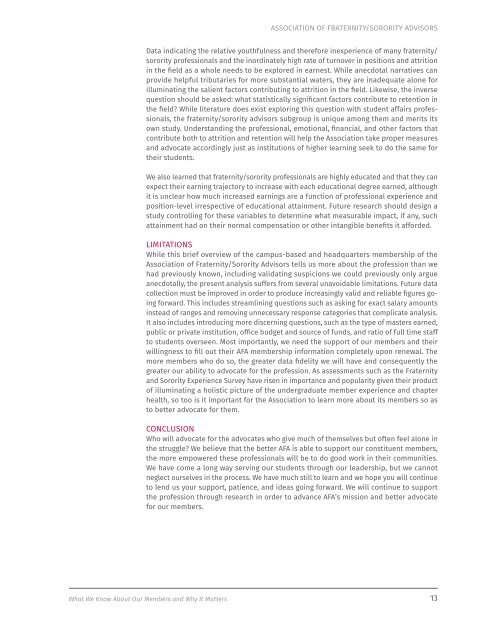The Association of Fraternity/Sorority Advisors Membership
21wXrUv
21wXrUv
You also want an ePaper? Increase the reach of your titles
YUMPU automatically turns print PDFs into web optimized ePapers that Google loves.
ASSOCIATION OF FRATERNITY/SORORITY ADVISORS<br />
Data indicating the relative youthfulness and therefore inexperience <strong>of</strong> many fraternity/<br />
sorority pr<strong>of</strong>essionals and the inordinately high rate <strong>of</strong> turnover in positions and attrition<br />
in the field as a whole needs to be explored in earnest. While anecdotal narratives can<br />
provide helpful tributaries for more substantial waters, they are inadequate alone for<br />
illuminating the salient factors contributing to attrition in the field. Likewise, the inverse<br />
question should be asked: what statistically significant factors contribute to retention in<br />
the field? While literature does exist exploring this question with student affairs pr<strong>of</strong>essionals,<br />
the fraternity/sorority advisors subgroup is unique among them and merits its<br />
own study. Understanding the pr<strong>of</strong>essional, emotional, financial, and other factors that<br />
contribute both to attrition and retention will help the <strong>Association</strong> take proper measures<br />
and advocate accordingly just as institutions <strong>of</strong> higher learning seek to do the same for<br />
their students.<br />
We also learned that fraternity/sorority pr<strong>of</strong>essionals are highly educated and that they can<br />
expect their earning trajectory to increase with each educational degree earned, although<br />
it is unclear how much increased earnings are a function <strong>of</strong> pr<strong>of</strong>essional experience and<br />
position-level irrespective <strong>of</strong> educational attainment. Future research should design a<br />
study controlling for these variables to determine what measurable impact, if any, such<br />
attainment had on their normal compensation or other intangible benefits it afforded.<br />
LIMITATIONS<br />
While this brief overview <strong>of</strong> the campus-based and headquarters membership <strong>of</strong> the<br />
<strong>Association</strong> <strong>of</strong> <strong>Fraternity</strong>/<strong>Sorority</strong> <strong>Advisors</strong> tells us more about the pr<strong>of</strong>ession than we<br />
had previously known, including validating suspicions we could previously only argue<br />
anecdotally, the present analysis suffers from several unavoidable limitations. Future data<br />
collection must be improved in order to produce increasingly valid and reliable figures going<br />
forward. This includes streamlining questions such as asking for exact salary amounts<br />
instead <strong>of</strong> ranges and removing unnecessary response categories that complicate analysis.<br />
It also includes introducing more discerning questions, such as the type <strong>of</strong> masters earned,<br />
public or private institution, <strong>of</strong>fice budget and source <strong>of</strong> funds, and ratio <strong>of</strong> full time staff<br />
to students overseen. Most importantly, we need the support <strong>of</strong> our members and their<br />
willingness to fill out their AFA membership information completely upon renewal. <strong>The</strong><br />
more members who do so, the greater data fidelity we will have and consequently the<br />
greater our ability to advocate for the pr<strong>of</strong>ession. As assessments such as the <strong>Fraternity</strong><br />
and <strong>Sorority</strong> Experience Survey have risen in importance and popularity given their product<br />
<strong>of</strong> illuminating a holistic picture <strong>of</strong> the undergraduate member experience and chapter<br />
health, so too is it important for the <strong>Association</strong> to learn more about its members so as<br />
to better advocate for them.<br />
CONCLUSION<br />
Who will advocate for the advocates who give much <strong>of</strong> themselves but <strong>of</strong>ten feel alone in<br />
the struggle? We believe that the better AFA is able to support our constituent members,<br />
the more empowered these pr<strong>of</strong>essionals will be to do good work in their communities.<br />
We have come a long way serving our students through our leadership, but we cannot<br />
neglect ourselves in the process. We have much still to learn and we hope you will continue<br />
to lend us your support, patience, and ideas going forward. We will continue to support<br />
the pr<strong>of</strong>ession through research in order to advance AFA’s mission and better advocate<br />
for our members.<br />
What We Know About Our Members and Why It Matters<br />
13


